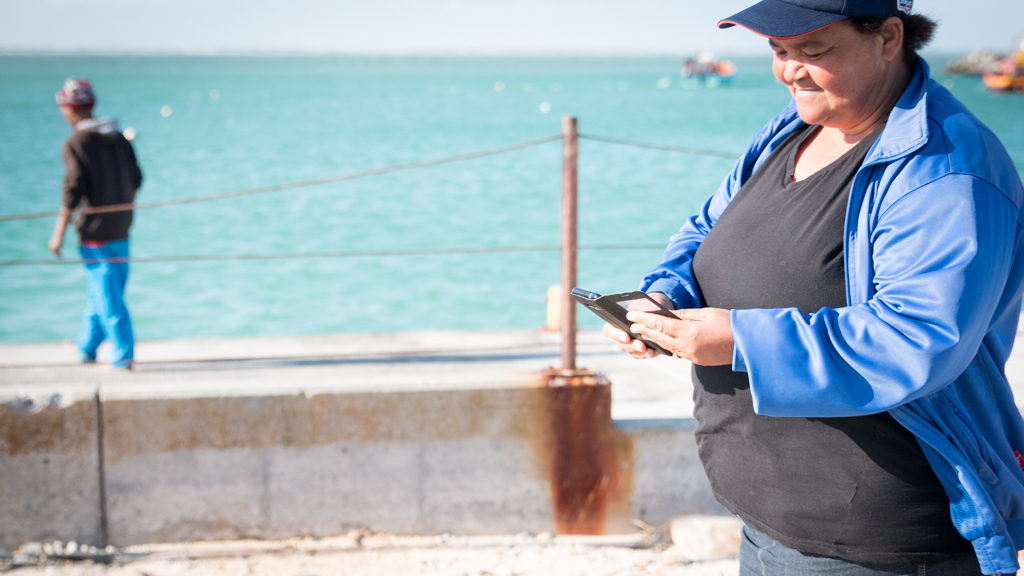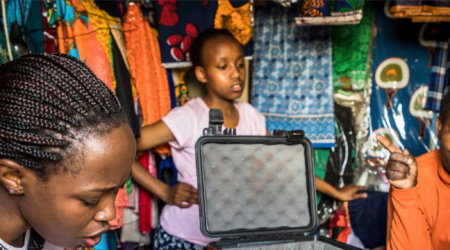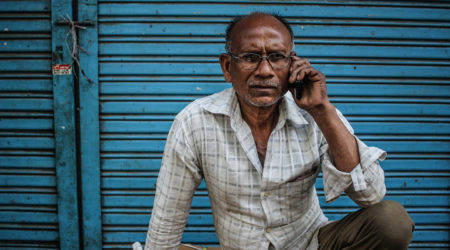Fintech in the new normal: how four startups are innovating during COVID-19

(A customer of Abalobi)
The global pandemic is now a part of our daily lives – it’s become a new normal rather than a short-term blip. While many actors in the fintech space were initially concerned that funding shortfalls and curtailed runways would spell doom for many startups, the sector has been reassuringly robust, aided by the overall growth and innovation in digital payments and ecommerce, the rapid digitization of several sectors of the economy, and higher digital adoption by consumers. In fact, a recently released report by Briter notes that in 2020 funding for tech startups reached almost $2.5 billion (includes deals, acquisitions, mega deals, and M&A), the lion’s share of it (31%) went to fintech startups.
In April, we wrote about fintech startups that pivoted or enhanced their offerings to help people in emerging markets cope with the economic effects of the crisis. As the pandemic has dragged on, we continue to see fintech startups innovating and providing essential services for customers in today’s new normal. Often this means helping users adapt to shifts toward digital payments, online purchasing, and new livelihoods. As detailed in this blog, startups in our portfolio and across the globe have demonstrated their creativity and ability to adapt to meet this challenge. Their efforts are paying off; we found that underserved users continue to find startups’ offerings’ useful and, in fact, they are increasing usage of digital financial products.
Abalobi
In the case of Abalobi, a Catalyst Fund portfolio company that connects small-scale fishers to restaurants in South Africa, the team quickly moved to adjust to restaurant closures. The initial model for Abalobi’s marketplace offering was designed to help the fishers secure fair prices by connecting them directly to restaurant owners who would purchase their daily fully-traceable and fresh catch. When lockdowns ensued, however, this was no longer feasible, and the team needed to shift quickly to support those who had come to rely on their services. Abalobi reoriented their model to allow fishers to connect directly to consumers’ homes through what is referred to as a Community Supported Fishery (CSF) approach. This was followed by broadening the marketplace portfolio to include large and smaller retailers, food clubs, and various soup kitchens and other urban food security schemes. The team redirected Abalobi’s existing logistics system to support the fishers, and to continue focusing on enabling more sustainable fishing practices, while distributing personal protective equipment to all fisher communities to remain operational during the pandemic.
The model is new to Abalobi, but it is a natural extension of its original approach, and has the added benefit of also improving the resilience of the program. The CSF model builds on Abalobi’s fundamental principle of connecting communities and fishers to balance oversupply and shortfalls in fish type and availability throughout the seasons. Moreover, those fishers participating in the program can now afford to keep some of their catch for home consumption or for local deliveries within their own communities, effectively offering fish at a heavily-subsidised, affordable price, even as the portion of the catch sold on the marketplace earns a solid return.
At the end of the first quarter of 2020, Abalobi introduced its home delivery service in Cape Town and its southern suburbs, and expanded the delivery area to include most suburban areas. Today, the Abalobi Marketplace app and a parallel WhatsApp group enable online ordering and digital payments supporting 1,920 beneficiaries and 3,430 registered fishers, creating a new model that will serve both sides of the market well even after the pandemic.
Asaak
In Uganda, Asaak, has also reoriented to help its users adjust to the pandemic. When Asaak joined Catalyst Fund, the team had developed a revolutionary mobile financial product and paired it with high-touch customer service to offer products that could be accessed anywhere, without the hassle or judgement of traditional institutions. At the beginning of the pandemic, the startup was serving hundreds of boda boda drivers – motorcycle taxis that are prevalent throughout Uganda.
After a series of lockdowns were announced in Uganda, Asaak saw many of their customers, especially drivers, face dramatic drops in income as restrictions were placed on movement. By leveraging their partnerships with Jumia and other e-commerce companies, Asaak was able to help their drivers find alternative employment as food and cargo delivery drivers, bringing essential items to people directly in their homes.
In addition, Asaak began offering driver referral services to logistics and ride-hailing companies to address persistent challenges regarding driver vetting and recruitment. They did this by leveraging their existing data (the Asaak Credit Score) to recommend drivers for employment. With this offering, the drivers are able to access a steady source of income and the logistics companies can reduce the risks and time involved in driver recruitment. Asaak also benefits by charging a small recruitment fee to both the driver and employer, providing the startup with much-needed revenue. Having achieved profitability post-lockdown, Asaak is now raising equity and debt capital for geographic expansion, new product innovation, and software development.
PesaKit
Another Catalyst Fund startup working to support underserved individuals through the pandemic is PesaKit. Their work was recently recognized by Inclusive Fintech 50, which named the startup a 2020 prize winner.
PesaKit provides mobile money agents with revenue-generating opportunities through a holistic platform, so they can better serve their customers and improve their financial health. The PesaKit app provides agents with cash flow analytics to help them optimize their operations as well as critical services like working capital to rebalance their float. It also provides agents with access to more revenue opportunities by enabling them to sell goods such as airtime, tokens, and microinsurance.
As agents were looking for additional ways to earn income during the pandemic, Peaskit created a way for them to participate in the growing world of ecommerce. Speaking on the IF50 panel on Driving Financial Inclusion, Health, and Resilience, Andrew Mutua, CEO and founder of PesaKit, noted that his company has improved mobile agents’ resilience by introducing a product called PesaKit Address, which enables them to act as e-commerce fulfilment points. PesaKit Address allows customers of mobile agents to more easily order, pay for, and receive goods, while also providing additional revenue streams for the agents. Additionally, PesaKit has digitized the agent onboarding process to ensure that it is safer and less cumbersome to become a user. This digital-first approach has resulted in 5,000+ new customers since August 2020 and is now intrinsic to how PesaKit operates.
Andrew also emphasized that existing PesaKit services have been useful to agents throughout the pandemic – for example, analytics for mobile money merchants have become even more critical because they find float management more difficult given unpredictable restrictions on travel and operating hours for financial institutions.
OZÉ
Finally, Meghan McCormick, Founder and CEO of OZÉ, shared how the startup adapted its solution to help users during the pandemic. OZÉ’s app enables small business owners to record their financial transaction and expense data, and provides analytics to help them make better decisions for their business. During the early days of the pandemic, almost 60% of OZÉ’s highly active users saw their revenue decline to nearly zero. OZÉ was able to integrate new content into their app, providing information on how restaurants could implement vouchers and how retailers should promote products such as cosmetics and clothing when customers are cutting back spending on non-essentials.
OZÉ also adjusted their model to provide additional flexibility, writing grace periods into lending contracts so that businesses could postpone repayments until the government relaxed lockdowns. In addition, they used their access to small business’ transaction records to predict creditworthiness so they can begin offering small loans to some of their users. To date, they have experienced no defaults.
Building on this success and powered by recent fundraising, the startup is now positioned for growth. Meghan notes that small businesses owners across the continent can download the app, and entrepreneurship support organizations that want to equip MSMEs with data-driven superpowers should email her.
Looking forward
Agile fintech startups have been able to adjust and reorient their services to become key agents of support for low-income customers during this difficult time, even as governments have struggled to support the most vulnerable. Their users continue to trust and depend on fintech startups and, according to our survey, are looking to them for additional support. This will inevitably lead to an increase in customer acquisition and utilization going forward. However, startups will need to work harder to distinguish themselves from predatory providers, who are proliferating given the vast needs and digital uptake created by the pandemic.
With continued support for innovation and experimentation, we are hopeful that fintech startups will be able to extend their offerings to more underserved users as well as provide additional support to their existing users, offering the digital financial services that will be critical to helping countries rebuild better after COVID-19.


